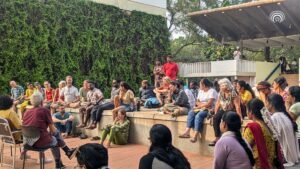Auroville, often referred to as the City of Dawn, represents a visionary experiment in conscious and sustainable living. At the heart of this utopian community lies a governance model that reflects its principles of unity in diversity and a commitment to sustainability. Anchoring this model is the Residents’ Assembly, an internal decision-making body that epitomizes Auroville’s core values of inclusivity, transparency, and shared governance.
The Residents’ Assembly is more than just a decision-making body; it is a symbol of unity and collective responsibility. This article explores the pivotal role of the Residents’ Assembly in shaping the present and future of Auroville, shedding light on its mechanisms, challenges, and the enduring lessons it offers for democratic processes and community building worldwide.
The Residents’ Assembly: A Democratic Experiment:
The Residents’ Assembly serves as the primary decision-making body in Auroville. Comprising all registered Auroville residents, irrespective of their nationality, background, or age, it is a testament to the community’s democratic ideals. The Assembly operates on key principles:
1. Inclusivity: The Assembly is open to every registered resident of Auroville, ensuring that all voices, regardless of their origin, are included in the decision-making processes.
2. Collective Decision-Making: Every member of the Assembly holds an equal voice and vote in community matters. Decisions are made collectively, nurturing a sense of shared governance and responsibility.
3. Transparency: The workings of the Assembly, including meetings, discussions, and financial matters, are open and accessible to all members. Transparency is the bedrock of the community’s governance model.
4. Unity in Diversity: The Assembly promotes the values of unity in diversity, encouraging the exchange of diverse perspectives and experiences to enrich the decision-making process.
The Role of the Residents’ Assembly:
The Residents’ Assembly is at the heart of the governance and decision-making processes in Auroville. Its responsibilities and functions are diverse, encompassing:
1. Decision-Making: The Assembly is the forum where community matters, policies, budgets, and land use are discussed and decided collectively. This ensures that the community’s direction aligns with the values and vision of Auroville.
2. Governance: Members of the Assembly elect representatives to the Auroville Council, an executive body responsible for the day-to-day administration of the community. The Council is accountable to the Assembly and regularly reports on its activities.
3. Planning and Development: The Assembly actively participates in the planning and development of the community’s infrastructure, guaranteeing that it aligns with the community’s vision of sustainable development.
4. Conflict Resolution: The Assembly serves as a platform for conflict resolution, where community issues and disputes are discussed and resolved collectively.
Challenges and Lessons:
Despite its unique model, the Residents’ Assembly faces its share of challenges, offering valuable lessons for democratic processes worldwide:
1. Managing Diverse Perspectives: Navigating the diversity of perspectives within the Assembly can be both a strength and a challenge. Ensuring that all voices are heard and respected is an ongoing process that requires effective facilitation and communication.
2. Balancing Inclusivity with Efficiency: Auroville’s commitment to inclusivity can sometimes result in lengthy decision-making processes. Striking a balance between inclusivity and efficiency is an ongoing challenge for the Assembly.
3. Transparency and Accountability: While Auroville’s governance model emphasizes transparency, ensuring accountability can be complex. Balancing the need for open governance with the privacy of individual residents is an ongoing challenge.
4. Maintaining Unity in Diversity: Fostering unity in diversity is a core value of Auroville. However, it can be challenging to navigate cultural, linguistic, and ideological differences within the Assembly.
Lessons for Democratic Processes Worldwide:
The Residents’ Assembly in Auroville offers valuable lessons for democratic processes worldwide:
1. Inclusivity and Equality: Ensuring that all voices are heard, regardless of nationality or background, is a hallmark of a vibrant democracy. Inclusivity and equality in decision-making processes foster a sense of ownership and shared responsibility.
2. Collective Decision-Making: Collective decision-making, where decisions are made collectively, encourages a sense of shared governance and fosters the development of policies and actions that reflect the community’s values and vision.
3. Transparency and Accountability: Transparency and accountability are essential elements of a healthy democracy. Open governance, coupled with accountability mechanisms, ensures that the community’s direction remains in line with its vision.
4. Unity in Diversity: Navigating diversity within a democratic body enriches the decision-making process. Embracing diverse perspectives and experiences leads to more well-rounded and thoughtful policies and actions.
Conclusion:
The Residents’ Assembly in Auroville is more than just a democratic body; it is a symbol of hope, unity, and collective responsibility. It reflects the enduring vision of Auroville for a better and more conscious world, where democratic principles are not just ideals but lived realities. The Assembly embodies Auroville’s commitment to inclusivity, transparency, and shared governance, offering lessons that extend far beyond the community’s borders, and providing valuable insights for those seeking to build a more democratic, sustainable, and harmonious world.



